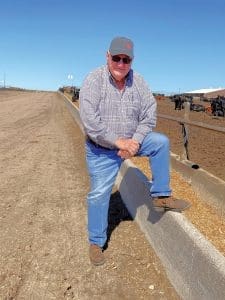By Megan Webb, Ph.D., Contributing Editor
Market drivers like the weather, feed resources, logistics, animal disease and consumer behavior continuously influence the beef industry. Like any business, the cattle business must be market driven to remain stable and sustainable. Due to the unfortunate circumstances of Mother Nature’s events – namely droughts in the west, fires in Kansas and tornadoes in Kentucky – the decision making has been unsettling. These circumstances, confounded with the conditions already in place from COVID, have skyrocketed input costs and exponentiated inflation. In a year’s time, the cost of gain has increased by about $30 per hundredweight.
Due to these greater input expenses, cattle are being backgrounded a shorter time and short fed at the feedyard, making the transition to harvest faster as a mechanism to manage inputs. Producers are seeking additional revenue potential, and some are pivoting their production enterprises by maintaining ownership in the feedyard and managing carcass sales. This gives cattlemen the leverage to connect closer to the consumer and capitalize on the higher retail margin. Many cattlemen are finding this integration as another value-adding opportunity to their business. I’ve been enlightened and inspired by these producers discovering additional systems to better benefit their operations.
With these discoveries, more farmers and ranchers are wanting to become involved in the beef processing segment and even band cattle herds to vertically integrate into a shortened beef supply chain to benefit local economies. Many producers in Idaho, Iowa, Nebraska and Wisconsin are working together to raise funds and build or re-start harvest and packing facilities. However, I still believe a likely challenge for these new and upcoming initiatives is the workforce shortage. Many large plants like Tyson, provide competitive wages and benefits, and still struggle to hire enough workers to fill their plants. Though, it is well understood that cattlemen are risk takers, and they appear to be ready to take on these associated risks. In some risk-mitigation strategy, I anticipate that many of these new plants will be built to be able to withstand collapses in the labor workforce and streamline the supply chain.
Plants of the Future
I believe the recent market drivers that occurred during the pandemic will continue to drive plant advancements and will include artificial intelligence from gate to plate. Plants of the future will be more focused on transparency of the supply chain and consumer claims, which better link the consumers to the producer. More plant advancements will be important to economical sustainability, including providing their own sources of power in additional to water recycling, solar power integration and geothermal heating.
Future producer or cooperatively owned plants will aim to be more vertically integrated and produce their own value-added products, including pet food and treats as well as ready-to-eat processing facilities. While being more diverse and vertically integrated, these plants will likely be smaller and have advanced technological innovations to remove human labor and enhance worker safety.
These innovations will help beef processing become more streamlined like poultry and pork processing. For example, more automation will be used for carcass splitting, evisceration, and limb and head removal. These investments will likely open more jobs in the industry for persons with backgrounds in systems management, IT, mechanics and engineering.
In addition to the workforce shortage, food safety will continue to be a constant market driver. Evaluating easier ways for hide removal could be investigated to reduce trimming labor, contamination and ultimately improve food safety.
Collectively, the beef industry is making many market-driven decisions to be more prepared for the future. Ongoing vertical integration will permit cattlemen and women to better control their destinies and, ultimately, local supplies of beef.
E-mail comments to mjwbeef@gmail.com






